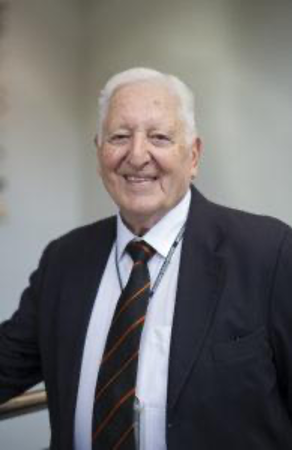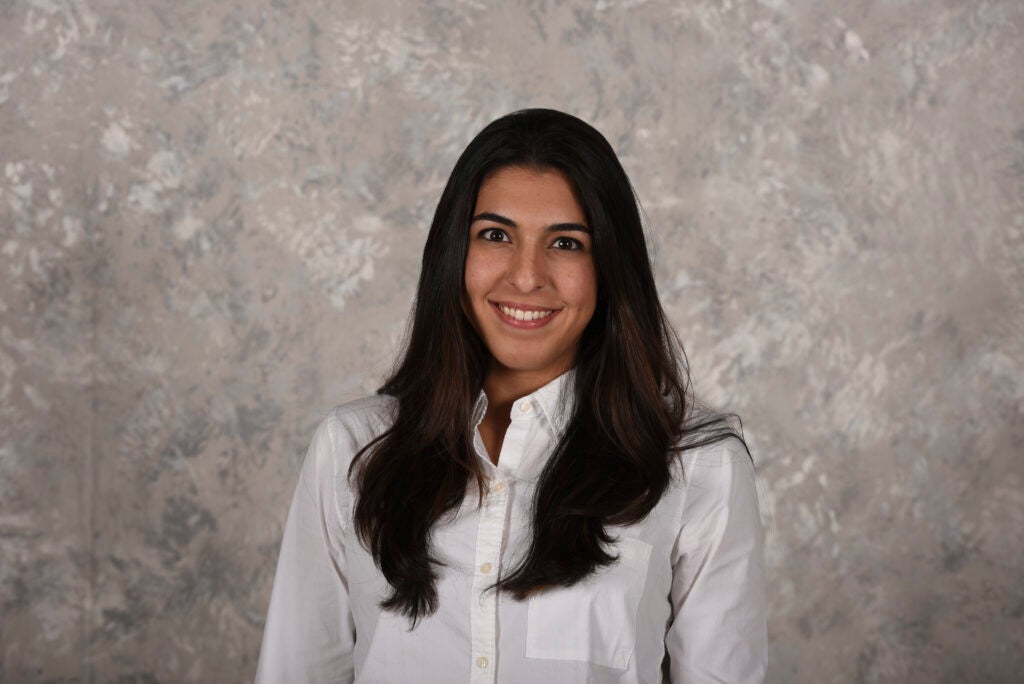Biotechnology Graduate Hour: A Lifelong Commitment to Biotech Starts at Georgetown
August 24, 2020
On August 4th, faculty member Dr. Richard Ascione and alumna Amanda Hershberger (‘14) joined the Georgetown biotechnology community members and several prospective students for another installment of Georgetown’s Bi-Monthly Biotechnology Graduate Student Hour series. These discussions, hosted over Zoom and facilitated by Program Manager Karen Brotherton-Julien, bring together bright biotech minds to share conversation, insights, and advice about the Master’s in Biotechnology program and beyond. As always, the speakers covered diverse aspects of the biotech experience and answered their attentive audience’s wide-reaching questions following their presentations.
The Georgetown University Biotechnology Graduate Student Hour concluded its final session of the summer this past Tuesday August 18th. The purpose behind these virtual seminar meetings was to spotlight former alumni employed in various biotechnology market areas as well as hear from adjunct faculty members who offer courses in the Biotechnology Program at Georgetown University. For prospective and current students, these meetings offered valuable information pertaining to the advantages offered by the M.S. in Biotechnology Program and possible career paths that lie ahead post-grad.

Dr. Richard Ascione
Dr. Richard Ascione has been with the Program since its inception. Even before he became one of its first professors, he was a collaborator and close friend of Dr. Jack Chirikjian, the Program’s founding director. Balancing his dedication to Georgetown Biotech with his official leading capacities in several companies, he inspires students in his two classes — Medical Toxicology and Molecular Medicine — to reach for success. Dr. Ascione noted that his goal is to “get students interested in subjects that are current and employable;” his courses are “designed to teach subject matter that will be helpful for jobs” in the biotech industry. Students in his Molecular Medicine course not only learn about the science behind drug development, but also are left with an “idea of how to get a drug product to market,” fusing valuable scientific and business lessons for real world applications. Dr. Ascione is no beginner to the intersection of these fields — he is the founder and CEO of biotech companies OnkoLogix and ImmunoLogix, as well as the CSO of OnkoRx, and has spent his career making enormous contributions to biological research. His former students in attendance on the presentations enthusiastically reminisced on their time in his classes.
After the presentations, participants were able to chime in with questions and connect over biotech-related current events. Dr. Ascione noted that though the COVID-19 pandemic has had disastrous effects on the job market as a whole, the recent Georgetown biotechnology graduates were now given the unique opportunity to funnel their knowledge and experience into life-saving jobs in the biotech industry. Khuyen Mai, faculty member and director for the Capstone Internship Program, echoed this sentiment and advised students to “look for organizations ramping up production during the pandemic and join forces” with them in order to make the most impact. Input from faculty, staff, alumni, and community members made for another productive discussion and valuable insight into the Georgetown Master’s in Biotechnology Program. Before signing off, Dr. Ascione continued his lifelong business of keeping people healthy and reminded attendees to wear their masks and keep their distance.
The final Graduate Student Hour session featured talks from alumnus Hiteshri Choksi (2018 graduate) and Diba Zomorrodi (2017 graduate.) Hiteshri’s post-grad career path includes employment in the regulatory affairs field, where she specializes in pharmaceutical and medical device consulting. Diba’s career path involved lab-based experience which led her to working in regulatory affairs where she specializes in gene therapy.

Hiteshri Choksi
Hiteshri Choksi is a Spring 2018 alumni. She completed her course work on the BioBusiness track. Hiteshri’s undergraduate degree gave her exposure to wet-lab skills and the research side of biotechnology. After devoting a good amount of time in learning the core science of this subject, she was then curious to acquire insight into the business and commercial facets of the healthcare industry. This is when she decided to pursue the M.S. in Biotechnology Program at Georgetown University. What interested Hiteshri the most about the BioBusiness Track was that it provided her an opportunity to learn about the entire product development process and the various nuances involved like clinical trials, FDA approval pathways, commercialization and the post-approval marketing strategies involved in the pharmaceutical industries.
When asked about the noteworthy classes offered by the M.S. in Biotechnology Program, Hiteshri immediately recalled Dr. Chirikjian’s Introduction to Biotechnology Industry class, offered during the fall semester. This class provided her with a unique perspective into the various career opportunities offered in the biotechnology industry. Hiteshri became interested in regulatory affairs consulting after learning about the FDA approval pathways for drug development. She chose to intern at a medical devices regulatory firm, MCRA (MusculoSkeletal Clinical Regulatory Advisors), where she picked up some skills used in the consulting world. Hiteshri mentioned that an advantage of working in consulting is the wealth of information and experience you are exposed to, owing to the multiple hats that you end up wearing. Hiteshri continued living in D.C. for six months after her graduation, working in Dr. Rosenthal’s biochemistry lab at Georgetown University and is now currently working as a Regulatory Affairs Associate at Freyr Solutions. Based on Hiteshri’s experience in the initial stages of her career, she added that consulting can be a great way forward for students that are unsure of their career trajectory because it provides visibility into multiple dimensions of the healthcare industry.

Diba Zomorrodi
Diba Zomorrodi is a Spring 2017 alumni that focused her M.S. in Biotechnology on the BioScience track. Her undergraduate degree in biology led her yearning for more experience in research. After discovering the vast wet-lab opportunities that were available through the Georgetown University Master’s in Biotechnology Program, Diba enrolled in the school. She knew the classes in the program would expose her to different career paths. Diba completed her capstone internship project in Dr. Priscilla Furth’s lab in the Georgetown Lombardi Comprehensive Cancer Center. She was able to obtain crucial experience in this lab-based internship opportunity through learning translational biotechnology techniques such as the effects of different chemotherapeutic agents on mammalian culture.
Diba continued on the research track post-grad with a position at the Lawrence Livermore National Laboratory through the GU-LLNL Fellowship. This opportunity provided her with experience on another side of research, which was in the toxicology lab. Diba focused her studies in the lab on the pharmacokinetics of an in-house, small molecule, where she looked at different stages of the drug development process. She then landed a job at the global pharmaceutical company, Amgen, where she learned analytical methods for the characterization of monoclonal antibodies. She currently works as a Senior Regulatory Affairs Specialist at Spark Therapeutics, a start-up company that is located in Philadelphia, Pennsylvania. This job opportunity arose through a former alumnus that Diba had networked with throughout the program.
These virtual Graduate Hours have provided both prospective and current students with a plethora of information regarding the courses offered and the networking opportunities available through adjunct faculty and past alumni. During the final question-and-answer forum at the conclusion of the guests’ presentations, Hiteshri and Diba offered advice centered around the importance of networking and how fostering connections led to employment opportunities. Hiteshri discussed how job applications through websites are not enough. Students should expand their network by speaking to alumni and researching individuals in the biotechnology industry with positions that interest them. Diba was able to secure her employment position from knowing a former alumnus at the company. She mentioned how it is harder to get your name out there with larger companies. Knowing someone personally inside the company (that can vouch for you) can help your application materials stand out amongst other candidates.
Although the virtual Graduate Hour meetings have come to a close with the start of the fall semester, Program Manager Karen Brotherton-Julien intends to continue the sessions in October and will feature leaders in the biotechnology industry. Program attendees found these meetings to be extremely helpful in determining which courses were of interest to take in their career path as well as the career opportunities that are available in the biotechnology market post-grad.
By Tierney Sovic, MS in Biotechnology Candidate, Dec 2020, and Alexandra Trouilloud, Biotechnology Program Communications Intern
Contributors: Richard Ascione, Hiteshri Choksi, Diba Zimorrodi
Edits by Vasna Nontanovan